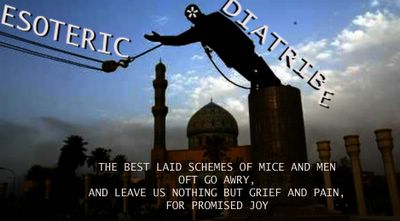On August 6, 2004 the President made some remarks at a Picnic at Bittersweet Farm in Stratham, New Hampshire. Among these remarks, the President said the following:
Before September the 11th, the ruler of Iraq was a sworn enemy of America. He was defying the world. He was firing weapons at American pilots which were enforcing the world's sanctions. He had pursued and he had used weapons of mass destruction. He harbored terrorists. He invaded his neighbors. He subsidized families of suicide bombers. He had murdered tens of thousands of his own citizens. He was a source of great instability in the world's most volatile region. He was a threat.
After September the 11th, we looked at all the threats of the world in a new light. I want you to remember a lesson of September the 11th was that we must take threats seriously, before they fully materialize. (Applause.) The September the 11th Commission concluded our institutions of government had failed to imagine the horror of that day. After September the 11th, we could not fail to imagine that a brutal tyrant, who hated America, who had ties to terror, who had used weapons of mass destruction might use those weapons or share his capabilities with enemies.
See, we saw a threat. We looked at the intelligence of the day and saw a threat. The United States Congress, members of both political parties -- including my opponent -- looked at the same intelligence and came to the same conclusion. (Applause.) The United Nations looked at the intelligence and recognized Saddam was a threat. They unanimously passed a resolution -- unanimously passed a resolution -- which said, disclose, disarm or face serious consequences. (Applause.) After defying the free world for 12 years, he did so again. He deceived the weapons inspectors. And so I had a choice to make: Do I forget the lessons of September the 11th --
THE AUDIENCE: No!
THE PRESIDENT: Do I trust a madman? Or do I take action necessary to defend our country? Given that choice, I will defend America every time. (Applause.)
THE AUDIENCE: Four more years! Four more years! Four more years!
THE PRESIDENT: And because Saddam Hussein sits in a prison cell, America and the world are safer. (Applause.)
Even though we did not find the stockpiles that we thought we would find, we did the right thing. (Applause.) He had the capability and he could have passed that capability on to our enemies.
Now, there are some questions that a Commander-in-Chief needs to answer with a clear "yes" or "no." My opponent hasn't answered the question of whether, knowing what we know now, he would have supported going into Iraq. That's an important question and the American people deserve a clear "yes" or "no" answer. (Applause.) I have given my answer. We did the right thing, and the world is better off for it. (Applause.)
Essentially, Bush called Kerry out to give a clear yes or no answer as to whether he would still have supported going to war, knowing what we know now. Kerry responded as follows:
Yes, I would have voted for the authority. I believe it was the right authority for a president to have."
Source
Not exactly a yes or no answer, and certainly filled with nuance and wiggle room, incase Kerry wants to give us some more
waffles... actually, this answer adds to his list of
waffles since Kerry came out as the "Anti-war candidate" caling the war in Iraq a "mistake." Regardless, Kerry decided that he would have, again, voted for giving the President the authority to go to war with Iraq.
Here is where the story gets better... Yesterday, August 10, 2004, President Bush responded to Kerry's admission at a Pensacola, Florida rally. President Bush said the following:
After September the 11th we looked at all the threats of the world in a new light. One of the lessons of September the 11th is that America must take threats seriously before they fully materialize. (Applause.) We saw a threat. My administration looked at the intelligence and saw a threat. The United States Congress looked at the same intelligence; members of both political parties, including my opponent, looked at the intelligence and came to the same conclusion.
We went to the United Nations, which looked at the intelligence and demanded a full accounting of Saddam Hussein's weapons programs, or face serious consequences. After 12 years of defiance, he again refused to comply. He deceived the weapons inspectors. So I had a choice to make: either forget the lessons of September the 11th and take the word of a madman who hated America, or defend this country. Given that choice, I will defend America. (Applause.)
Even though we did not find the stockpiles that we expected to find, removing Saddam Hussein from power was the right thing to do. (Applause.) Saddam Hussein had the capability to make weapons of mass destruction. And he could have passed that capability on to terrorist enemies. After September the 11th, that was a chance we could not afford to take. And America and the world are safer because Saddam Hussein sits in a prison cell. (Applause.)
And now -- and now, almost two years after he voted for the war in Iraq, and almost 220 days after switching positions to declare himself the anti-war candidate, my opponent has found a new nuance. He now agrees it was the right decision to go into Iraq. After months of questioning my motives and even my credibility, Senator Kerry now agrees with me that even though we have not found the stockpile of weapons we all believe were there, knowing everything we know today, he would have voted to go into Iraq and remove Saddam Hussein from power. I want to thank Senator Kerry for clearing that up. (Applause.)
Source
Yes, I agree... thank you, Senator Kerry, for walking right into that one.
 Waffles
Waffles 




